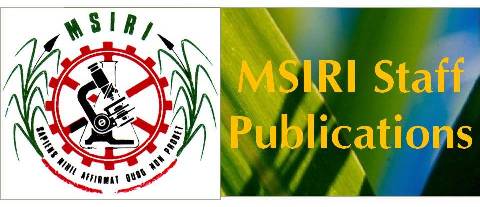Sugar production: integration among sugar, alcohol, residue cycling and sustainability-a report on the 2009 agronomy workshop
| MSI10P4460 | |
| Ng Kee Kwong, K. F. | |
| Sugar production: integration among sugar, alcohol, residue cycling and sustainability-a report on the 2009 agronomy workshop | |
| periodical article | |
| 2010 | |
| Proc. int. Soc. Sug. Cane Technol. | |
| 27: 6 p. | |
| En | |
| En | |
| The 2009 Agronomy Workshop was held from 24 to 28 May 2009 in Uberlandia, Brazil. It was attended by some 70 participants with 22 of them travelling overseas from 13 different countries. The workshop was a success with 33 oral presentations (and 16 posters) spread under the following five specific themes: new technologies for sustainable sugar cane production, ratoon yield decline and its management, modeling sugarcane growth and production, soil and plant residue management, and the challenge of environmental pressure and strategy for the sugarcane grower. The workshop was also an opportunity to gain an insight into the sugar industry in Brazil, in particular the cultural practices adopted and the status of research and development in the country. The workshop has served as a reminder to technologists that optimising sugarcane production requires high quality seed to establish the plantation and the adoption of an integrated approach to the management of the crop. This integrated approach to optimise or enhance productivity includes the adoption of the most suitable technology in irrigation, fertilisation, weed management and crop protection. Though it is accepted that a sustainable sugarcane production system lies in soil organic matter conservation, particularly through green-cane harvesting, the management of the residues to avoid loss in productivity still needs to be researched. There will be no universally applicable residue-management system, and each system will need to be tested under the specific conditions prevailing locally. With the rising demand for higher fibre cultivars for cogeneration and ethanol synthesis, research and development in sugarcane agronomy will be increasingly focussed towards optimising the partitioning of the biomass in favour of fibre. The workshop has also created awareness that research and development initiatives will not attain the objective of enhanced productivity if social and organisational constraints impacting negatively on agronomic practices at field level are not addressed. | |
| Sugar sugarcane productivity trash management green manuring irrigation fertilisation weed control | |
| Mauritius | |
| Sugarcane | |
| 2010-03-17 | |
| EN | |
| LIB | |
| CAT | |
| MSIRI |
